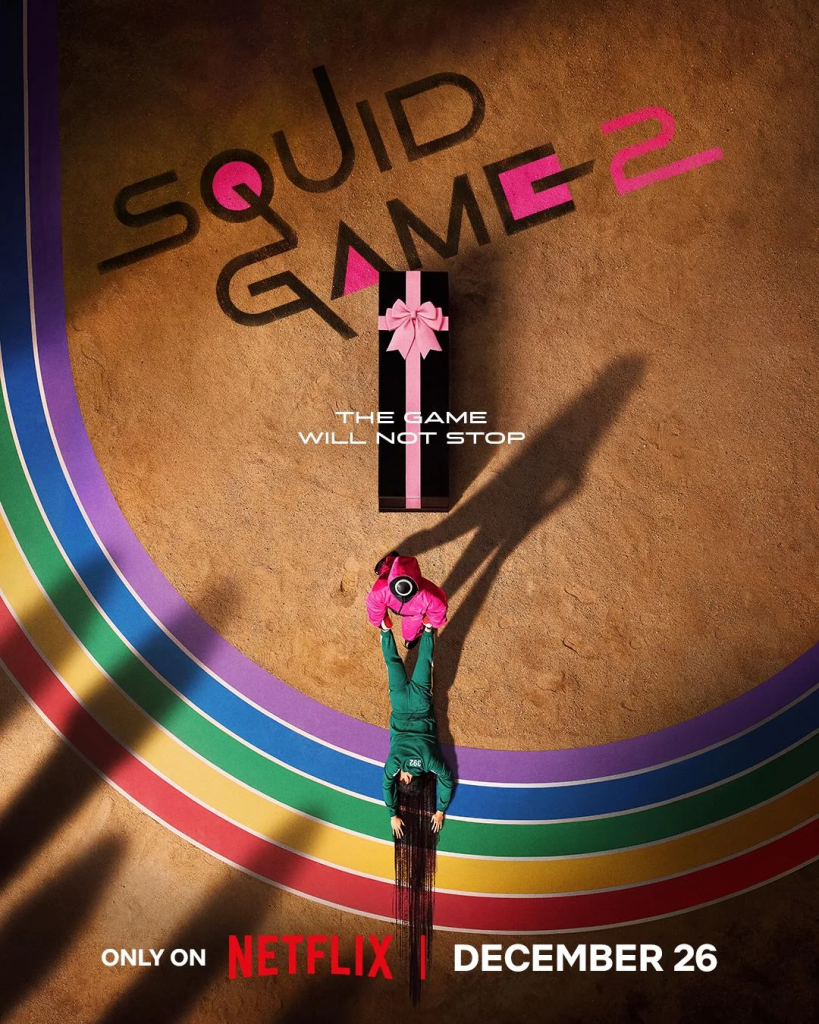Before discussing Squid Game 2, let’s first talk about Squid Game 1.
For me, Squid Game 1 was a special experience. It was a show that made me realize just how fickle and shallow I can be.
When I first watched it, I found it entertaining, but I wasn’t entirely satisfied with the ending.
There were a few reasons for this:
1️⃣ The overwhelming reliance on luck – The games depended too much on chance rather than strategy or intellect. I was hoping for more tactical showdowns, but instead, most of the competition was purely luck-based.
2️⃣ Excessive melodrama – I felt that the emotional storytelling was overdone, making certain scenes feel unnecessarily dramatic.
3️⃣ Too many team-based activities – Despite being a death game where survival was key, there were too many team-oriented challenges, which somewhat undermined the tension of individual survival.
There were other reasons as well, but these three were the main ones that kept me from fully enjoying Squid Game 1.
Then, at some point, the show’s popularity skyrocketed, turning into an unbelievable global phenomenon.
That’s when I started questioning myself—did I fail to truly understand this work?
Earlier, I mentioned how Squid Game 1 made me realize how fickle I am. When it was first released in Korea, it faced significant criticism, and I shared many of those negative opinions. But after its global success, I began to rethink my stance.
💡 Ah! There must be a deeper philosophy behind this!
💡 There must be hidden messages in the events and character relationships!
With that mindset, I rewatched the show, this time looking for meaning—and suddenly, Squid Game 1 felt like a masterpiece.
One scene that particularly stood out to me was the Gganbu episode. Initially, I found it childish and lacking context. But after seeing how many people were deeply moved by it, shedding tears over the scene, I ended up crying too. Ah… just how shallow am I?
Now, when I rewatch Squid Game 1, I can appreciate how well-crafted and immersive it is. However, I still find some parts a bit childish. But above all, what struck me the most was how this show made me confront my own inconsistencies and fickle nature—it was a shocking realization brought on by a drama.
Now, Let’s Talk About Squid Game 2, Returning After Three Years.

Plot Summary
The story picks up two years after the events of the first season.
The protagonist, Seong Gi-hun, is determined to stop the Squid Game and has been searching for the mysterious man in the suit, a key figure behind the organization. Meanwhile, Hwang Jun-ho, the police officer and younger brother of the Front Man, is also looking for the Squid Game in hopes of finding his brother. During his search, he crosses paths with Gi-hun.
Gi-hun eventually locates the Man in the Suit and, after successfully winning a game of Russian roulette, gains access to the organization’s communication channels. He expresses his desire to re-enter the game, securing his way back in.
Before entering, Gi-hun implants a GPS tracker in his molar, intending to transmit his location to Hwang Jun-ho. This time, however, he isn’t playing for the money—his goal is to save the participants and put an end to the Squid Game from the inside.
That’s the basic premise of Squid Game 2.
Standout Strengths of Squid Game 2
The most striking improvement in this season, in my opinion, is the significant reduction of luck-based elements in the games.
In Squid Game 1, I considered the Glass Bridge episode to be the worst game, and here’s why:
This type of game completely disregards the unique characteristics of each character. Among the participants, some are extremely intelligent, some are foolish, and others are cowardly. However, the Glass Bridge game completely ignores these traits—it erases character depth and turns survival into pure luck.
On the other hand, Squid Game 2 eliminates purely luck-based games altogether. Team-based games now emphasize skill, teamwork, and individual decision-making, making them far more engaging. Instead of random chance, we see moments of quick thinking and strategic plays, which add a stronger sense of logic and immersion to the show. A great example is Oh Young-il’s actions in the Round and Round game, which felt highly convincing and contributed to the show’s intense engagement.
Another standout aspect of this season is how well it retains Squid Game’s signature identity—combining nostalgic childhood games with death-match survival. Some international viewers may not share the same cultural experiences as Koreans, but the beauty of these games lies in their simplicity—the rules are easy to understand at a glance. When these innocent childhood games are recontextualized with deadly stakes, the result is an incredibly immersive and thrilling experience.
Finally, the most impressive aspect is how effectively the show portrays the psychology, mental state, and actions of people facing imminent death. In films and dramas that deal with survival, capturing the mindset of those on the brink of death is crucial. Squid Game 2 does this exceptionally well by introducing a diverse cast of unique characters, each responding to life-and-death situations differently. This variety creates compelling and thought-provoking scenarios, making the show even more fascinating to watch.
Notable Issues in Squid Game 2
While Squid Game 2 has its strengths, it also has several noticeable flaws.
1️⃣ The Characterization of Seong Gi-hun
Seong Gi-hun, after witnessing so many deaths in Squid Game 1, enters the new game with the goal of minimizing casualties. His character remains consistent with this ideology throughout the season—until Episode 7. At this point, Gi-hun makes an incomprehensible decision, choosing to sacrifice a fellow participant. What makes this worse is that he doesn’t sacrifice an enemy, but rather an ally.
To be fair, Seong Gi-hun has always had a certain degree of hypocrisy. This is evident in Cho Sang-woo’s remark in Season 1: “You’re just a nosy person with no real ability.” Additionally, in Season 2, Episode 1, the Man in the Suit tells Gi-hun: “You’re just another piece of trash. You only got lucky and avoided being discarded.” These lines encapsulate his character.
So, while his hypocritical decision in Episode 7 makes sense in the broader context of his character, it still feels inconsistent. This moment significantly affects the future trajectory of his character development. It raises an important question: Will viewers still be able to support and root for Gi-hun in Season 3?
2️⃣ Lack of Narrative Logic
In Episode 7, Gi-hun suggests stealing the guns from the masked guards and launching an attack against the organizers. However, it’s unclear why the other participants agree to this plan.
Most of the contestants joined the game to win prize money and return home—not to start a rebellion against the organizers. Why would they suddenly shift their focus from survival and financial gain to open warfare?
Additionally, from the contestants’ perspective, the guards in pink uniforms vastly outnumber them and are heavily armed. Stealing a few guns wouldn’t be enough to turn the tide in their favor. Furthermore, some contestants remain hidden in the dormitory, yet they don’t take action to suppress the uprising, even though it would obviously have a significant impact on the game’s outcome. These inconsistencies make the sequence feel forced rather than organic.
3️⃣ The Issue of Season 2’s Completeness
By Episode 7, the pacing accelerates dramatically, creating a stark contrast with the more methodical storytelling in Episodes 1–6. The sudden shift in tempo makes it difficult to fully absorb and process the unfolding events. Then, just when the story needs resolution, the season abruptly ends, leaving the narrative incomplete.
A season should function as a self-contained narrative arc. If a story is left incomplete, then it shouldn’t be called a “season”—instead, it should be labeled Part 1. If the show had been marketed this way, viewers would have expected an unresolved ending and patiently waited for Part 2. Instead, the current format makes the conclusion feel abrupt and unsatisfying.
Because Squid Game 2 lacks a fully developed, standalone narrative, discussing character development feels somewhat meaningless at this stage. Perhaps it would be better to evaluate the characters only after Season 3 concludes.
Final Verdict
Overall, I would rate Squid Game 2 3.5 out of 5 stars.



